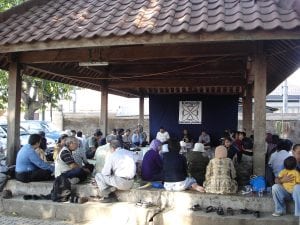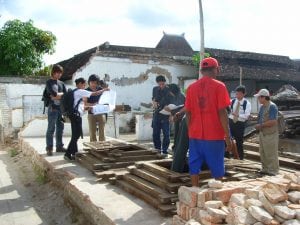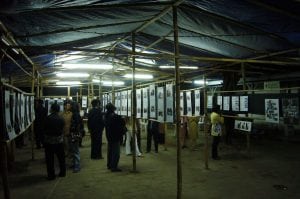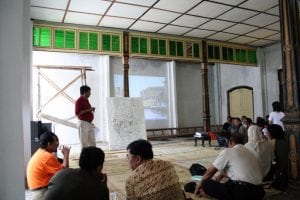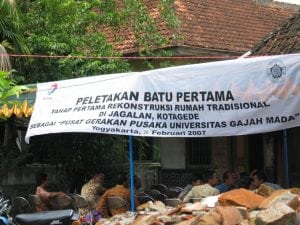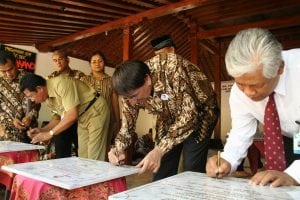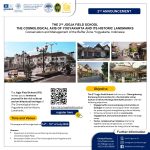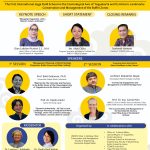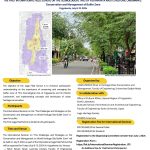Introduction
Kotagede, the former capital of Islamic Mataram Kingdom in 16C, located about 6 km to the south east of Yogyakarta City , Indonesia . Kotagede, means “big city”, represents the Javanese ideal site and its unique characteristics. In this century, the two components of the city remain are the Grand Mosque of Mataram and the market that is still busy. Although the remains of the palace & parts of the royal features have been long ago disappeared, the residential structure still exhibits the significant Javanese culture. Residents living in those houses also work as silver crafters.
May 27, 2006, the tectonic earthquake has destroyed thousands of buildings and infrastructures in Yogyakarta region, and took more than 5,800 lives. It has also damaged a lot of high cultural heritage/monuments (adipusaka budaya) as well as folk heritage (pusaka rakyat) such as traditional houses in Kotagede heritage district and many other sites. This Kotagede heritage district was also destroyed and it is estimated 20 years to recover and revitalize.
Principles of Actions & Agenda
The Japanese International Cooperation Agency (JICA) has supported a Community Empowerment Program to revitalize the Kotagede Heritage District since July 17, 2006 until March 26, 2007 under the “Community Empowerment Program through POSYANIS & Village Revitalization in Bantul District”, a collaboration work of Universitas Gadjah Mada and JICA. A model for conservation that consists of six-part approaches has been conducted in this CEP. The six part model approach of Heritage District Conservation (Adishakti, 2003) are:
1). Organization & management
The establishment of the Heritage District Local Organization on Heritage District Management or “Organisasi Pengelola Kawasan Pusaka” (OPKP) Kotagede in August 17, 2006. A series of intensive training for OPKP has been carried out including the development of OPKP working Plan 2007 which needs assistant to implement it. A seed money for OPKP (12 months) has been granted by Government of Royal Netherlands, and the Team of CEP UGM – JICA needs to control and monitor the utilization of the fund from January 2007 – December 2007.
2). Documentation & presentation
A compilation and preparation of base map and other secondary data have been collected. The detail assessment for tangible and intangible heritage and its data base formulation for Sub District Jagalan have been completed. A special data on traditional houses for Sub District Prenggan and Purbayan has been carried out. A series of training for assessors has been conducted along with the inventory program.
3). Promotion
Series of local, national, and international symposiums, workshops and exhibition, , have been organized and planned such as National Workshop on Heritage District Post Earthquake in Kotegede, 4th International Field School Symposium and Workshop on Asian Heritage in Kotagede. A logo of Kotagede heritage district has been launched as well. Some exhibition has been celebrated in Kotagede to increase community response to love their own cultural heritage. There are photo exhibitions included some persuate poster.
4). Activity planning
Working with the local to formulate the adaptive reuse of heritage buildings as well as the events plan. An art and culture program for 2007 has been planned. Some ideas has been proposed by 4th IFSAH 2007 participants to response local assets as a place for cultural activities.
5). Physical planning and design
Working with local & POSYANIS for advocacy and restoration the heritage houses have been continuously organized including the promotion of a proper rehabilitation and reconstruction of 6 damaged heritages supported by the Dutch Government and Total Indonesie.. Universitas Gadjah Mada bought a damage traditional house in Kotagede and it will be utilized as Center for Heritage Movement UGM. Trainings on earthquake resistance of heritage buildings for local people have been managed.
6). Economy
To mediate fundraising activities by preparation of Heritage Foster Parents Program and Heritage Investment Program and its implementation. Some foster parents such Dutch Government, Total Indonesie (French oil company), Universitas Gadjah Mada, Better Air Quality Conference in Jogja, French investor provide funds.

